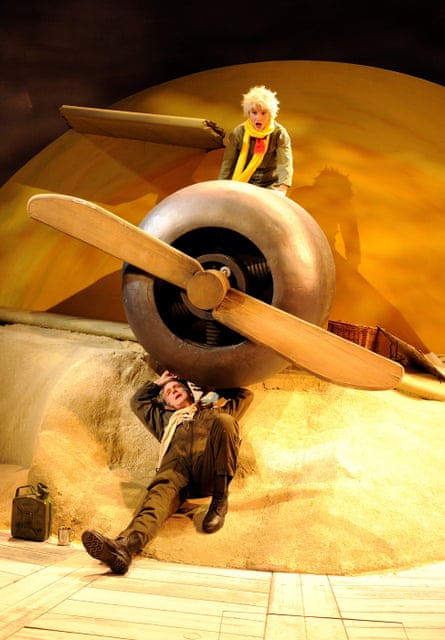Do you remember the fox? Not just any fox, this one is a sage; the one that reveals the truth to the Little Prince, who reveals it to the pilot, who reveals it to us, the readers. As he says goodbye to his friend, the fox tells the Little Prince, “Here is my secret. It’s quite simple: One sees clearly only with the heart. Anything essential is invisible to the eyes.” When as a child I first heard my father read me The Little Prince in a sunny room in Tehran, I was not aware that the story, along with tales from Shahnameh: The Persian Book of Kings, Pinocchio, the work of Mulla Nasrudin, the Alice stories, The Wizard of Oz and The Ugly Duckling, among others, would become one of the main pillars of my “republic of imagination”.
My father’s democratic way of introducing me to these stories shaped my attitude towards works of imagination as universal spaces, transcending the boundaries of geography, language, ethnicity, religion, gender, race, nationality and class. I knew that although this fox and his prince were products of a Frenchman’s mind, and although the book was written in a language foreign to me, at a time before I was born and in a place I had never seen, by virtue of hearing and later reading it, that story would also become my story, that Little Prince and fox belonged as much to me as Scheherazade and her 1,001 nights belonged to the French, American, British, Turkish, German and all other readers who would in reading cherish them and “tame” them, the way the Prince learned to tame the fox.
This is how I, a little girl from Iran, came to know and love France, through a little prince and a fox. I had met foxes before; in fact, my father introduced me to the animal in a fable by Jean de La Fontaine. In this story, like most stories, the fox is sly and clever, cheating a simple crow of his meal. Later, my father translated La Fontaine’s fables complete with their beautiful illustrations which he, an amateur painter, drew himself, copying from the originals. In those and most other illustrations the fox looked pretty, with a gorgeous bushy tail and wide eyes. The Little Prince’s fox was not pretty; its bushy tail, more like an upright broom, was not beautiful and his eyes were so narrow they could be barely seen. Yet this animal forever changed my attitude towards the fox – I began to see it in a different light. From this perspective, the fox’s slyness was not due to malice, but to the need to survive. Although I felt sorry for the chickens (which didn’t prevent me from eating them), the fox hunted them so that he could stay alive, unlike some human beings who not only kill and eat the chickens but hunt foxes for entertainment and sport. Gradually, I came to understand why those wide eyes, always brimming with anxiety and fear, seemed to be on the lookout for some invisible but very real menace.

At the time I had no idea why I was attracted to the Little Prince’s story. I did not know it was teaching me to acquire what is essential to the greatest works of imagination: the magical throbbing of the heart, defining us as human beings, connecting us to one another, giving us a reason to live, a way to survive, and to understand not just the value of happiness and love, but their close proximity to pain and loss. Without knowing it, I was experiencing that sense of deep anguish mixed with the joy of creation that is the source of all beauty. As I started to read more books, I discovered that the fox’s secret was shared by the greatest writers, poets, musicians, artists and thinkers, throughout time.
Last time I linked France to the fox was after the massacre at the Charlie Hebdo office, when the next issue of the magazine came out. The image of the prophet Muhammad, with tears in his eyes and the caption “Tout est pardonné”, had an effect on me beyond words. I wanted to cry, not just for the lives lost, but also for the compassion. They at Charlie Hebdo had not reciprocated their murderers’ violent fury; in the best tradition of art, they had taken us all to their domain, to the domain that defies cruelty and violence by refusing to be cruel and violent, refusing to become their enemy’s image of them. How could it be that this image made me think of the tenderness of my grandmother’s Islam, when she forgave with a seeming ease, never complaining and yet always firm in her belief, in her faith, in her sense of tolerance. This is how she “tamed” us, those of us among her wayward and unruly children and grandchildren who rebelled against her beliefs and her faith.
Tenderness is what we need in these heartless times. Not just in Nice and Paris, but in Damascus, Beirut, Brussels, New Orleans, Baghdad, London, Istanbul and all those other great cities around the world. We need tenderness not just against the brutal enemy from outside our borders, but for ourselves, caught in a web of fear and violence.
Today I am a long way from that sunny day in a Tehran that exists only in my memory, like my father; the shady streets of my childhood, the feeling of security and warmth in my room are long gone, even Tehran’s mountains are now hidden most days under the fog of pollution. But what has survived is the heart, and the fox. In my republic of imagination, they all live: Rudabeh, Vis, Esméralda, Elizabeth Bennet, Huck Finn, Emma Bovary, Natasha and Pierre, Catherine and Heathcliff, Anna Karenina, the Little Prince and the fox, all from such different times and backgrounds, all together, immortal and subversive.
The pilot who wrote the story of The Little Prince died long ago, but the fictional pilot, who told the story, is as alive today as he was decades ago, along with his Prince, the fox, the rose, the snake and the laughing stars, ringing bells that fill the clear nights with voices of the heart. In my mind’s eye, the stars only become more brilliant, their music more clear. They are signalling that they are here to stay, not just for French readers, but for readers all around the world – for the readers who have the eyes to see, the ears to listen and the courage to imagine.
